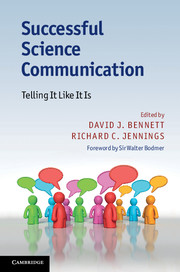Book contents
- Frontmatter
- Contents
- Foreword
- Authors' biographies
- Introduction Public engagement in an evolving science policy landscape
- Part I What it helps to know beforehand
- Part II Policy-makers, the media and public interest organisations
- Part III What you can do and how to do it
- 15 Building relations with the various groups
- 16 Finding the right words: how to shine in radio and television interviews
- 17 Nanotechnology and the media: front page or no story?
- 18 The power of the podcast: the Naked Scientists' story
- 19 The social web in science communication
- 20 Dealing with dilemmas and societal expectations: a company's response
- 21 Science festivals
- 22 Things to see and do: how scientific images work
- 23 The Triple Helix: the undergraduate student-run face of science communication
- 24 Public understanding of research: the Open Research Laboratory at the Deutsches Museum
- 25 Imagine: a communication project putting life sciences in the spotlight
- Part IV And finally, evaluating and embedding science communication
- Index
- Plate section
- References
21 - Science festivals
Published online by Cambridge University Press: 05 May 2013
- Frontmatter
- Contents
- Foreword
- Authors' biographies
- Introduction Public engagement in an evolving science policy landscape
- Part I What it helps to know beforehand
- Part II Policy-makers, the media and public interest organisations
- Part III What you can do and how to do it
- 15 Building relations with the various groups
- 16 Finding the right words: how to shine in radio and television interviews
- 17 Nanotechnology and the media: front page or no story?
- 18 The power of the podcast: the Naked Scientists' story
- 19 The social web in science communication
- 20 Dealing with dilemmas and societal expectations: a company's response
- 21 Science festivals
- 22 Things to see and do: how scientific images work
- 23 The Triple Helix: the undergraduate student-run face of science communication
- 24 Public understanding of research: the Open Research Laboratory at the Deutsches Museum
- 25 Imagine: a communication project putting life sciences in the spotlight
- Part IV And finally, evaluating and embedding science communication
- Index
- Plate section
- References
Summary
What are science festivals? – their special characteristics
A ‘festival’ is a day or period of celebration (historically usually for religious reasons), or an organised series of cultural events, such as concerts or films. Over the last decade the UK has seen a huge surge in the number of festivals celebrating science. This is concurrent with the increase in music festivals over a similar period – it would seem the British are a festival-loving nation. Science festivals generally focus their activity around a town or a city, often using multiple locations and frequently bringing science-related activities to places where these would not usually take place, such as pubs, bookshops, railway stations and in the case of the British Science Festival in 2006 and 2007, Norwich Cathedral and York Minster. They are invaluable opportunities for the host cities's universities to showcase their research and their researchers, and for local science-based industries to throw their doors open and let festival-goers see what takes place inside. What makes science festivals unique among other types of public engagement activity is the fact that they bring hundreds of thousands of people into direct face-to-face contact with scientists and engineers every year in a rich and diverse mix of activities.
The UK's science festivals embrace all of the scientific disciplines and all seek to explore the role that science plays within today's society. Festival events take on a wide variety of formats. Many have family-focussed days which bring together a broad range of hands-on activities in one area. The Edinburgh International Science Festival has a daily event at the City Art Centre which it describes as ‘seven floors of fantastic fun for all the family’. Within its daily programme a visitor can typically find a range of workshops, shows, hands-on activities and exhibitions all aiming to engage with and inspire young people about science (Edinburgh International Science Festival, 2010). The Cambridge Science Festival bases many of its events within university laboratories and lecture theatres, inviting members of the public in to try hands-on experiments and attend talks and discussions for all ages (Cambridge Science Festival, 2010). All of the UK's science festivals include a programme of schools-specific activities within their schedules (Figure 21.1). This may involve having school parties attend Festival events but also includes outreach activities. For example, TechFest, Aberdeen and the north-east of Scotland's annual science festival, has a large secondary schools' programme which takes place entirely as an outreach activity locating around 40 scientists, engineers and science communicators out in the region's secondary schools (TechFest, 2010).
- Type
- Chapter
- Information
- Successful Science CommunicationTelling It Like It Is, pp. 312 - 331Publisher: Cambridge University PressPrint publication year: 2011
References
- 4
- Cited by



